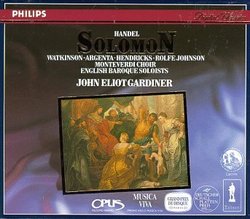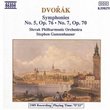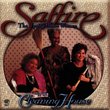| All Artists: George Frideric Handel, English Baroque Soloists, Monteverdi Choir, John Eliot Gardiner, Nancy Argenta, Barbara Hendricks, Anthony Rolfe Johnson, Della Jones, Joan Rodgers Title: Handel - Solomon / Watkinson, Argenta, Hendricks, Rolfe Johnson, EBS, Monteverdi Choir, Gardiner Members Wishing: 0 Total Copies: 0 Label: Philips Release Date: 10/25/1990 Genre: Classical Styles: Opera & Classical Vocal, Historical Periods, Baroque (c.1600-1750) Number of Discs: 2 SwapaCD Credits: 2 UPC: 028941261229 |
Search - George Frideric Handel, English Baroque Soloists, Monteverdi Choir :: Handel - Solomon / Watkinson, Argenta, Hendricks, Rolfe Johnson, EBS, Monteverdi Choir, Gardiner
 | George Frideric Handel, English Baroque Soloists, Monteverdi Choir Handel - Solomon / Watkinson, Argenta, Hendricks, Rolfe Johnson, EBS, Monteverdi Choir, Gardiner Genre: Classical
Acts I and III of this oratorio are sumptuous pageants: Solomon on the throne with his adoring Queen; Solomon receives the Queen of Sheba. In between, Act II's depiction of Solomon's judgment (over the baby) is one of the ... more » |
Larger Image |
CD DetailsSynopsis
Amazon.com essential recording Acts I and III of this oratorio are sumptuous pageants: Solomon on the throne with his adoring Queen; Solomon receives the Queen of Sheba. In between, Act II's depiction of Solomon's judgment (over the baby) is one of the finest dramatic scenes Handel wrote in any context. The First Harlot's fear, desperation, and gratitude, the Second Harlot's grief-crazed jealousy, Solomon's serene wisdom--all are smashingly portrayed by Handel and by Rodgers, Jones and Watkinson. Argenta's Queen is a girlish delight; the regal Hendricks as Sheba sounds quite comfortable among these Baroque specialists; Rolfe Johnson and Varcoe have two splendid arias each. The choir and orchestra--whether in the amorous "Nightingale" chorus, the sequence of pictorial numbers in Act III, or the stunning double choruses throughout--are magnificent. --Matthew Westphal Similarly Requested CDs
|
CD ReviewsGreat Performance of a Great Oratorio Thomas H. Moody | Nobleboro, ME United States | 03/13/2000 (5 out of 5 stars) "This recording is in a league of it's own. It's one of the finest recordings of any Handel oratorio. Gardiner is in top form both in exucution and in creating musical drama. The orchestra and the chorus are clean and direct and the soloists are all first rate. Carolyn Watkinson, in the title role, has never sounded better. The scene between Solomon and the two Harlots is brought vividly to life by the wonderful Joan Rodgers and Della Jones along with Watkinson. Here the singers, along with Gardiner and the orchestra, sucessfully create a scene of pathos and spitfire vengeance - all at the same time. Rodgers brings heartbreaking sympathy to her character - the First Harlot and Jones delivers a truly stunning depiction of hatred and jealousy in her portrayal of the Second Harlot. This scene sizzles (unlike the recent McCreesh recording). Barbara Hendricks is stately and regal in the role of the Queen Of Sheba. Her performance of "Will the Sun Forget to Streak" is a gem. Not only is the aria truly gorgeous, but Hendricks' delivery is straightforward and her diction is incredibly clear and precise. This aria is definately one of the highpoints of the oratorio and reminds the listener of what is to be learned from the great deeds of Solomon Appearing near the end of the work, it's pivitol to the summation of the entire composition. Purists will quibble with some of the cuts Gardiner has made, but in listening to the new McCreesh performance, which is complete and uncut, one can see why Gardiner cuts what he does (perhaps with the exception of Sheba's first aria)and what he was trying to achieve by doing so. This is a recording that every serious classical music lover should not be without." Solomon has a great English King Jacques COULARDEAU | OLLIERGUES France | 04/17/2004 (5 out of 5 stars) "This Biblical oratorio by Haendel is a masterpiece. Haendel's Biblical oratorios are an essential moment in the development of Western music. It deals with a sacred subject but the objective is no longer to educate the people in their religious belief, like Bach's Passions, but to entertain the court and the cultured audience of the Restauration's third king. This particular oratorio is a way to thank George II for the hospitality he granted Haendel with in England. Three acts, three moments of Solomon's greatness. First the building of the Temple and the establishment of the kingdom. It is centered on one feeling : Solomon's love for his Queen and the merging of their love with nature. God has become an abstract being that can be experienced in human feelings like love and in nature. God is everywhere. « All is pious, all is great ». This first act only lightly alludes to the three people Solomon had to put to death to establish his power : Adonijah, Joab, and Shimei. Second the famous court decision by Solomon about the baby and the two women who claim him as their son. In semitic terms this case is impossible because there are no witnesses. Solomon then has to use a subterfuge to trap the two women in their feelings and reveal the one who is the real mother : one is satisfied with the death of the child because she is vengeful for having been reported as a child thief ; one prefers dropping her claim and save the life of the child, her child. It is the motherly attitude that convinces Solomon that this latter one is the real mother. Solomon is a king of justice. Third the visit of the Queen of Sheba, marvelously sung by Barbara Hendricks. Solomon welcomes her, as he should and must, but he falls in love with her and has to step over this obstacle and give the upper hand to virtue, which is not that easy to do nor to have the Queen of Sheba accept. But after the tempest everything goes back to normal. And this virtuous victory is another sign of Solomon's greatness. The music is light, dramatic, intense at times, always magical. It is a musical pageant. But the most surprising element is the fact that Solomon is sung by a mezzo-soprano, a woman, and it is quite audible. What is the point of this shift ? Was the choice between a castrato and a mezzo-soprano, or soprano ? Maybe. But if this Solomon is supposed to represent George II, the English monarch, and the English monarchy, this alliance between a female unicorn and a male lion, this woman in military outfit, we do need to have a voice that sounds feminine even if it sings the part of a man. The mezzo-soprano is slightly lower than the two queens who are sopranos, hence more masculine than them, and yet the high-pitched voice gives this king a youthful resonance that a tenor might not have had (it would have been more adult) nor a lower voice (it would have sounded plain old). Here Solomon is nearly a teenager, definitely a young man. And Haendel uses this element marvellously in many places : the various duets with his Queen or the Queen of Sheba, but also the duet with the false mother, a mezzo-soprano too. By making Solomon sound younger and more feminine, Haendel gives him a deeper and wider greatness : he will be a good king for a long time. And this is addressed to George II. What a compliment.Dr Jacques COULARDEAU" G.F. Handel's Solomon Jacques COULARDEAU | 08/03/1999 (3 out of 5 stars) "Every praise to this recording be paid. Great singers!Ev'n tho' Gardiner's scissors are present too: "...I decided in the overall interest of the dramatic continuity of the piece to sacrifice Sheba's first and Solomon's last aria, and with less regret two of Zadok's airs and one of the Levite's".He changed completely the final of this oratorio, the question is: Should Mr. Gardiner choose what we have to listen to?The answer, absolutely NO.I prefer McGegan's system: He puts the whole music in the CDs; so with the CD player system everyone can program the sequences of the work."
|

 Track Listings (17) - Disc #1
Track Listings (17) - Disc #1








